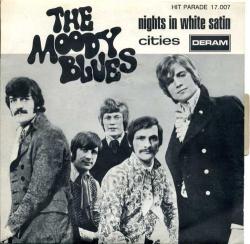Moody Blues (20) band info
<p>The Moody Blues are an English rock band. Among their innovations was a fusion with classical music, as heard in their 1967 album Days of Future Passed.</p>
<p>The Moody Blues have sold more than 55 million albums worldwide and have been awarded 18 platinum and gold discs. As of 2015 they remain active with one member from the original 1964 band (drummer Graeme Edge) and two more from the 1966 lineup (bassist John Lodge and guitarist Justin Hayward).</p>
<p>The Moody Blues formed on 4 May 1964, in Erdington, Birmingham, Warwickshire. Ray Thomas, a juvenile John Lodge and (occasionally) Michael Pinder had been members of El Riot & the Rebels. They disbanded when Lodge, the youngest member, went to technical college and Pinder joined the army. Michael Pinder then rejoined Thomas to form the Krew Cats. Back from a disappointing spell in the Hamburg region a few months later,[2] the pair recruited guitarist/vocalist Denny Laine, band manager-turned-drummerGraeme Edge and bassist Clint Warwick. The five appeared as the Moody Blues for the first time in Birmingham in 1964. The name developed from a hoped-for sponsorship from the M&B Brewery which failed to materialise, the band calling themselves both "The M Bs" and "The M B Five" and was also a subtle reference to the Duke Ellington song, "Mood Indigo".[3] Around this time the band were the resident group at the Carlton Ballroom, later to become rock music venue Mothers on Erdington High Street.</p>
<p>Soon, the band obtained a London-based management company, 'Ridgepride', formed by ex-Decca A&R man Alex Murray (Alex Wharton), who helped them land a recording contract with Decca Records in the spring of 1964. Initially they were signed to a management company who then leased their recordings to Decca. They released a single, "Steal Your Heart Away", that year which failed to chart. The Moody Blues appeared on the cult TV programme Ready Steady Go! singing the uptempo 'B' side "Lose Your Money (But Don't Lose your Mind)". But it was their second single, "Go Now" (released later that year), which really launched their career, being promoted on TV with one of the first purpose-made promotional films in the pop era, produced and directed by Alex Wharton. The single became a hit in Britain (where it remains their only Number 1 single)[4] and in the United States, where it reached No.10. The band encountered management problems after the chart-topping hit and subsequently signed to Decca Records in the UK (London Records in the US) as actual recording artists. A four track extended play release titled: "The Moody Blues" featuring both sides of their first two Decca singles was issued in a colour picture sleeve in early 1965.</p>
<p>Their debut album The Magnificent Moodies, produced by Denny Cordell with a strong Merseybeat/R&B flavour, was released on Decca in mono only in 1965. It contained the hit single together with one side of classic R&B covers, and a second including four Laine/Pinder originals.</p>
<p>Alex Wharton left the management firm and the group released a series of relatively unsuccessful singles. They enjoyed a minor British hit with a cover of "I Don't Want To Go on Without You" (No. 33) in February 1965, while the Pinder-Laine original "From the Bottom of My Heart (I Love You)" produced by Denny Cordell (with a vocal choral sound towards the conclusion that anticipated their later more famous vocal sound on "Nights in White Satin") was issued as a UK single in May 1965 and did a little better (No. 22). But then "Everyday", another Pinder-Laine song, stalled at No. 44 in October 1965 and no further British singles were released for just about a year. The group was still in demand for live gigs, though, and they did have some chart success in the U.S. and in Europe during those months when "Bye Bye Bird" (Decca AT 15048) was lifted from their album in December 1965 as an overseas single charting in France (No. 3).</p>
<p>In June 1966, Warwick retired from the group and the music business. He was briefly replaced by Rod Clark (born Rodney Clark, 23 November 1942, Surlingham, near Norwich, Norfolk), but in early October, Denny Laine also departed from the group,[5] which made Decca release "Boulevard de la Madeleine" c/w "This is My House (But Nobody Calls)" (Decca F 12498, 1966) only a few days later, as The Moody Blues seemed to be disintegrating. Clark joined the Rockin Berries.</p>
<p>In the November Issue of Hit Week, Dutch interviewers Hans van Rij and Emie Havers presented their story saying The Moody Blues had been in the process of recording their second album, Look Out,[6] with Cordell producing. The album was not to be and "Really Haven´t Got the Time" (released as a single c/w "Fly Me High" some months later) is the only song mentioned in the article but the authors say Laine had written all of the material, with Thomas, Pinder and Clark (still the bass player) singing lead vocals as well.</p>
<p>A final 'Mark One' Moodies single, Pinder-Laine's "Life's Not Life", was scheduled for release in January 1967 (Decca F 12543) c/w "He Can Win" even though Laine[7] couldn´t because the group had relaunched themselves without him months ago. (This single's release is often listed as being cancelled; however, both promo and regular stock copies have been seen over the years).</p>
close
